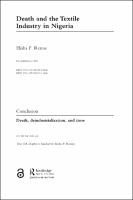Chapter Conclusion
Proposal review
Death, deindustrialization, and time
| dc.contributor.author | Renne, Elisha | |
| dc.date.accessioned | 2020-12-21T10:48:16Z | |
| dc.date.available | 2020-12-21T10:48:16Z | |
| dc.date.issued | 2021 | |
| dc.identifier.isbn | 9780367465520 | en_US |
| dc.identifier.isbn | 9780367524906 | en_US |
| dc.identifier.uri | https://library.oapen.org/handle/20.500.12657/45767 | |
| dc.description.abstract | "Many of the men who worked at KTL who have died since the closing of the Kaduna Textiles Limited mill without being paid their entitlements have had their names included on the list compiled by the Coalition of Unpaid Textile Workers Nigeria. This listing of names, along with their graves, funeral programs, and death certificates constitute “the work of the dead” in redressing some of the failures of their government and their society. The lack of food and health care, the minimum requirements needed for a decent life, suggest the need for new ways of thinking about the growing disparity in wealth—with ever greater inequality—in Nigeria. While this situation may be lessened through the reduction of corruption and through government programs for widespread food, health care, and education may be implemented, many Nigerians are considering the creation of alternative paths to well-being. Through the numerous programs proposed for increasing youth employment —training and support for small and medium enterprises, agricultural programs, and more efficient and environmentally sound smaller-scale industries, the possibilities for a new deindustrialized era are being imagined and may be pursued. " | en_US |
| dc.language | English | en_US |
| dc.subject.classification | thema EDItEUR::N History and Archaeology::NH History::NHH African history | en_US |
| dc.subject.other | burying, cemeteries, chapter, children, city, closure, coalition, colonial, conclusion, consequences, construct, dead, death, deaths, deindustrialization, dilemmas, elisha, experiences, fall, families, hardship, health, hometowns, houses, industry, introduction, kaduna, ktl, ltd, new, nigeria, p, problems, regimes, renne, rise, textile, textiles, time, unpaid, widows', work, workers. | en_US |
| dc.title | Chapter Conclusion | en_US |
| dc.title.alternative | Death, deindustrialization, and time | en_US |
| dc.type | chapter | |
| oapen.relation.isPublishedBy | 7b3c7b10-5b1e-40b3-860e-c6dd5197f0bb | en_US |
| oapen.relation.isPartOfBook | 1402ac25-9eb6-4447-8c08-db7b87c3d739 | en_US |
| oapen.imprint | Routledge | en_US |
| oapen.pages | 19 | en_US |
| oapen.remark.public | This OA chapter is funded by Elisha P. Renne. | |
| peerreview.anonymity | Single-anonymised | |
| peerreview.id | bc80075c-96cc-4740-a9f3-a234bc2598f1 | |
| peerreview.open.review | No | |
| peerreview.publish.responsibility | Publisher | |
| peerreview.review.stage | Pre-publication | |
| peerreview.review.type | Proposal | |
| peerreview.reviewer.type | Internal editor | |
| peerreview.reviewer.type | External peer reviewer | |
| peerreview.title | Proposal review | |
| oapen.review.comments | Taylor & Francis open access titles are reviewed as a minimum at proposal stage by at least two external peer reviewers and an internal editor (additional reviews may be sought and additional content reviewed as required). | |
| oapen.review.comments | Taylor & Francis open access titles are reviewed as a minimum at proposal stage by at least two external peer reviewers and an internal editor (additional reviews may be sought and additional content reviewed as required). |

